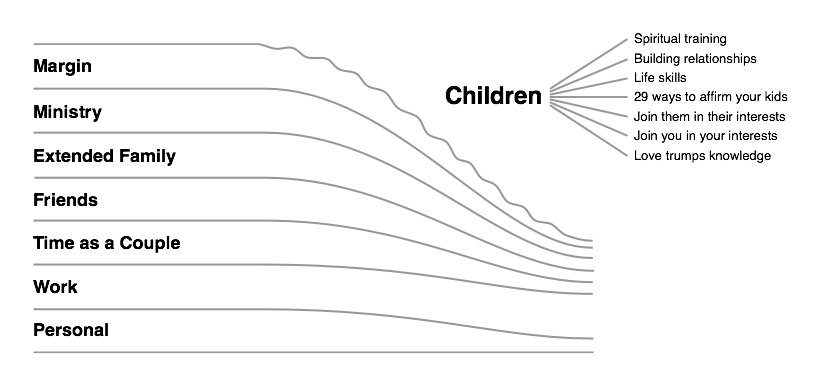For the past few weeks, I have been sharing material from a presentation I give on finding a Work-Family-Ministry balance. One of the habits I stressed in the spiritual training of our children section was reading the Bible and praying as a family. In fact, it was so important to Rhonda and I that our goal was to do this every day. When I make this presentation to a group, I always close with this question to make my concluding point, “You have only known me for about 45 minutes. But based on what I have shared and hearing this talk, if our goal was to read the Bible every day as a family and this is considered 100%, what percentage do you think we actually accomplished? If every day equals 100%, take a guess on how we did on a percentage basis.”
As you can imagine, the guesses are quite varied. But they usually land between 75 and 95%. I say, “You are being generous.” When Rhonda and I look back on 30+ years of having kids in the house, we estimate that we probably read the Bible together as a family about 30-40% of the days we intended to. Now at first glance, this may look like a failure. It may appear that we have a pretty poor track record at reaching our goal. But we see it as just the opposite.
Using the higher end of our range at 40%, this means that we read together 150 DAYS A YEAR MORE THAN ZERO for over 30 years. That is a lot of Bible reading. The point I am trying to drive home is this: PERFECTION IS NOT THE GOAL; CONSISTENCY IS.
If perfection is your goal, you will drive your kids, your wife, and yourself crazy. It is unattainable. No, perfection is not the goal. The goal is consistency. This is about real life. This is about chronic illness, recalcitrant children, financial setbacks, nagging sins, work stresses, personality challenges, fickle friendships, and academic hardships. Consistency is getting back on the horse when we have been knocked down by these life issues. Consistency is about not giving up no matter how long it has been since we tasted success.
Using the example we have been talking about, sometimes we would not read together for a month or more. In these times, I would always think the same thing. The kids are not even asking about our Bible reading. No one even seems to miss it. Maybe it is not having the influence or consequence that I think it is for our children. Let’s just quit and let the Bible reading habit go. But fortunately, I am married to a consistent wife who was not interested in letting any good thing go. Rhonda encouraged me over and over that we can do this. We just need to pick up the Bible and start again.
It was not just the Bible reading. Every valuable discipline that we ever had in our home was on again, off again. And Satan sought to use the “off again” as a temptation to quit. Did you hear that? Satan seeks to use the “off again” as a temptation to quit. But God would always give us the quiet reminder and the strength to pick up the ball and get back in the game of investing in our family. And soon, we were back to “on again”. Let me emphasize again, perfection is not the goal; consistency is.
May I encourage you that no matter where you are along the time line with your family, it is never too late to start or begin again to read the Bible together as a family, to develop a relationship with your children, to affirm your children, to make your quitting time at work as important as your starting time, to value your time as a couple, to preserve some margin in your family life for service, and to let love rule. As my friend Dave Gibson says, “It is never too late to start and always too soon to quit.”

